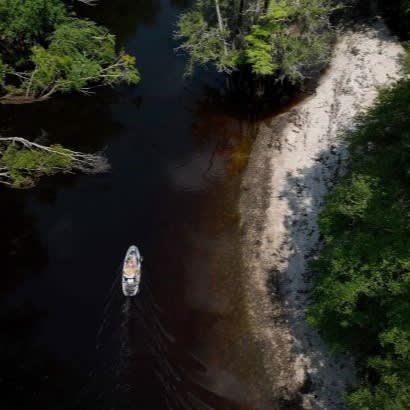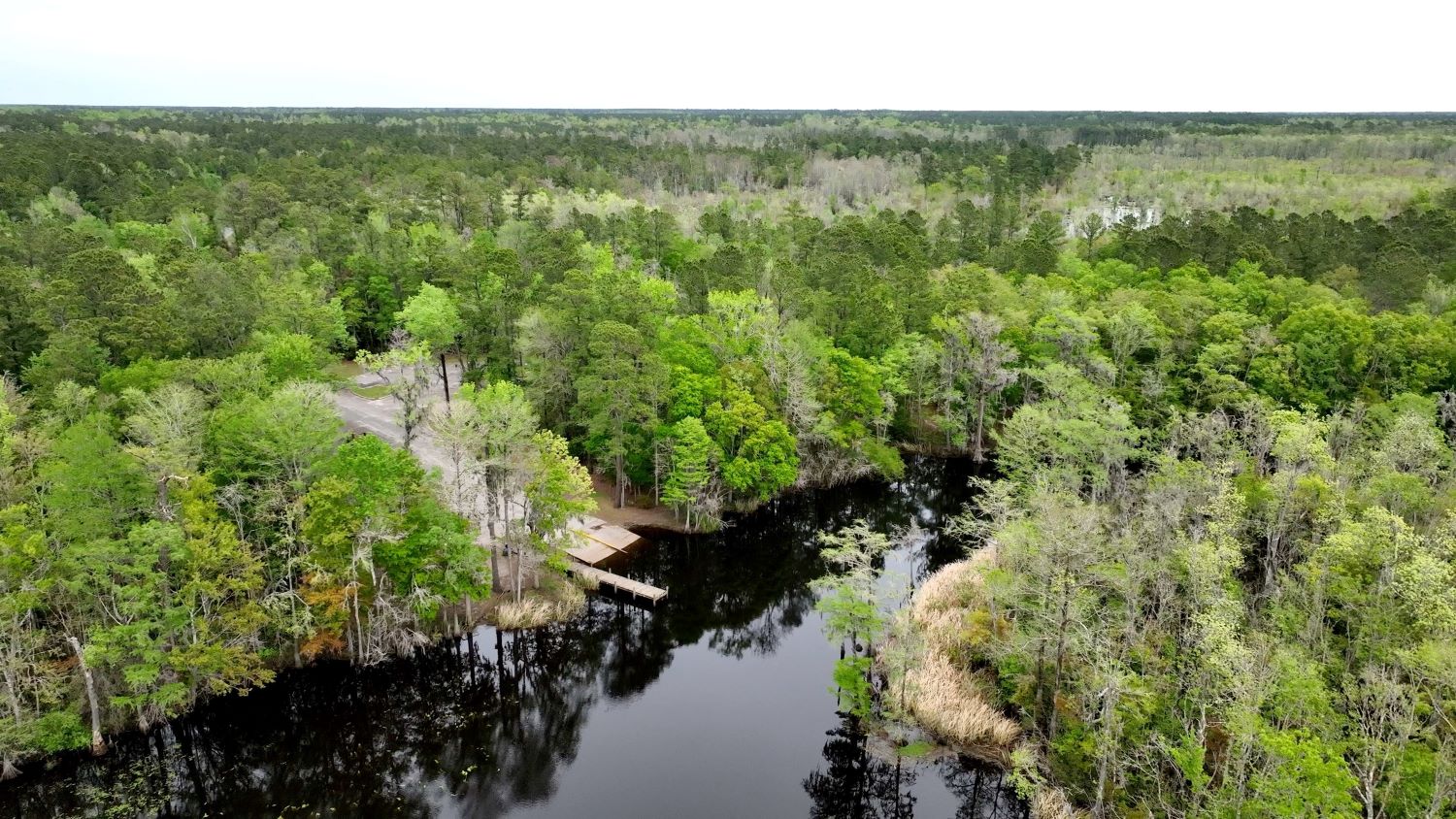
Pictured: A fisherman on a boat traveling on South Carolina’s Black River past green forests and a sandy riverbank. Photo courtesy of Adobe Stock.
What happens when the Land and Water Conservation Fund (LWCF) and a community come together to provide equal access to recreation, protect vital floodplains and create a new state park? At South Carolina’s Black River, this is exactly what’s happening. This year has been especially transformative for the Black River as the South Carolina Department of Parks, Recreation and Tourism (SCPRT) received LWCF funding to acquire land around the river in May, and Black River State Park was established in January. This represents South Carolina’s first new state park in 20 years, holding particular significance as the first state park in this under-resourced region.
“If you look at the map of all 47 South Carolina state parks, the biggest hole you’ll find is right here, right where we are....” says Samantha Queen, Director of Corporate Communications at SCPRT. “The Land and Water Conservation Fund was originally established to protect our lands, our waters and our historical heritage places. This project really checks all of those boxes. It’s an opportunity for us to make sure these lands and waters are preserved for generations of South Carolinians to come to enjoy.”
A coastal plain river, the Black River flows approximately 150 miles through five counties in South Carolina. The area is known for paddling, as the Black River offers a wild and remote boating experience with banks lined by ancient cypress trees. Beyond paddling, the surrounding land boasts a wealth of recreational activities, including fishing, swimming, hiking and birding. Despite its untamed feel, the Black River is surprisingly accessible: it is located less than 100 miles from 40 percent of the state’s population and just an hour’s drive from Charleston and Myrtle Beach, South Carolina.
Expanding Public Access
For more than 60 years, LWCF — a federal grant available to eligible local and state government entities to acquire or develop outdoor recreation areas and facilities — has strengthened communities and protected the United States’ public lands by improving access to outdoor spaces. In 1991, LWCF funding expanded public access to the Black River at Pine Tree Landing, which was one of only a few entry points to the river. In May, SCPRT received $821,000 in LWCF grant funding to acquire two new tracts of land, approximately 668 acres, to expand Black River State Park.
Pictured: Landscape of the Black River nature conservation area in South Carolina. Photo courtesy of Adobe Stock.
Thanks to LWCF, this land acquisition will lead to the creation of five new boat launches, strategically spaced so visitors can always find a convenient take-out point within a day’s paddle. Additional plans include riverside camping, trails, picnic shelters, tree houses, overnight accommodations and a visitor center.
Supporting Environmental Resilience
LWCF funding also will help expand conservation efforts and protect acres of floodplain for enhanced flood protection, water quality and recreational opportunities along the Black River. Ensuring the river is part of a healthy, connected swamp forest offers numerous benefits, such as protecting wildlife corridors, ensuring high water quality for both people and nature, and boosting regional resiliency by safeguarding floodplains against impacts from rain and hurricanes. South Carolina’s Black River has experienced increased rainfall in recent years, but LWCF funding for forest protection ensures the swamp forest remains intact, allowing the river’s flood banks to act as sponges and naturally buffering floodwaters to mitigate impacts on riverside communities and critical ecosystems.
“LWCF funding helps state and local entities acquire, enhance and create vital recreational areas that exist in perpetuity,” says Duane Parrish, SCPRT Director. “Outdoor recreation projects benefit our local economies and improve our quality of life. It’s exciting to see so many communities expanding their recreational opportunities.”
Black River State Park is anticipated to be fully complete by 2030. For the rural towns along its route, LWCF funding will help Black River State Park provide a connection to nature, expand access to public lands and increase environmental resilience in the region for generations to come.
To apply for LWCF funding, contact your state administrator.
Update: NRPA’s Public Policy and Advocacy team is closely monitoring the government shutdown and its potential impacts on NRPA members and park and recreation agencies nationwide. We will be updating this blog post as new developments become available.
Here’s what we know about LWCF:
The LWCF program is a reimbursement program, so immediate impacts are unlikely. However, staff being furloughed during the shutdown may potentially create a backlog in the project approval system.
What you should do: Reach out to your state LWCF grant administrator or contact.
Kaitlyn Brodie is a government affairs specialist at NRPA.
Related Stories:
- “Faces and Places of LWCF,” The Land and Water Conservation Fund
- “Open Space Institute and State of South Carolina Release Master Plan to Create New Black River Water Trail & Park Network,” Open Space Institute, June 2022
- “Revitalizing South Carolina: Two Sprawling New State Parks Now In The Works,” Charlotte Stories, January 2025
- “Expanding the Network of Protected Lands along South Carolina’s Black River,” National Oceanic and Atmospheric Administration Office for Coastal Management
- “21 recreation projects in SC will receive $7.7M in federal grants,” South Carolina Department of Parks, Recreation and Tourism, May 2025
- “New Parks On the Horizon,” South Carolina State Parks, April 2023



